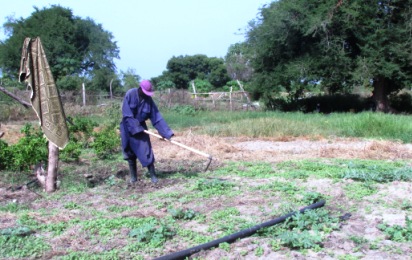FEATURE: Drought affects agro businesses in Jonglei state
July 17, 2015 (BOR) – About 51 organised farmers who invested in agro-business in Jonglei state capital of Bor, producing vegetable, maize for sale, have been severely affected by drought this year and appealed for intervention from relief organizations.

Malueth Jarbuom Machuor, who survived in the war with fractures after he was shot, retired in the army four years ago and became a farmer, where he had been earning his living.
“I am a farmer here producing maize, vegetables and some more crops for marketing and home consumption,” said Malueth.
In his half a fedan farm, Malueth planted okra, amaranths, tomato, kale, among other vegetables whose market is readily available in Bor. This people like Malueth have been severely affected by drought that started in May. Irrigation using the river Nile water is the only means of sustaining their crops, which is again an expensive operation using petrol-fuel generator.
“We are using one generator we have now purchased. But the pipes are short and it cannot reach far end of their farms. The cost of the fuel is high. If there were rains to supplement this irrigation; we would get good harvest, but now it is not possible,” he said.
As a former soldier in SPLA, his payment was just 600 pounds a month, currently equivalent of about $300 with the official bank rate and less than $50 in the black market rate in the country. But now he said his farm could get him better pay than before in the army.
“If your farm produces well, and you have a lot of vegetables in your farm, you can get at least 500 [South Sudanese] pounds daily, this is by far better than the pay I used to get when I was in the army,” said Malueth.
The much of their large farms went uncultivated this year due to lack of rains. The group also complain of lack of support from the ministry of agriculture to plough their farms as well as providing them with relevant pesticides to control pests affecting their crops.
This situation, they said, has affected their harvest, hence no good cash from their farms since May.
Elijah Kuai Reech, also a former SPLA soldier in the past, said thieves had been stealing their vegetables at night. The farmers’ live far away from their farms due to insecurity.
He said the ministry of agriculture had promised to help them with technical support and some agricultural inputs, like insecticide but nothing had materialised yet.
Abraham Mayom Lual said among the farmers were very old men and women, who could not irrigate their farms, urging NGOs like OXFARM to support them with at least two generators for irrigation.
“These old men and women cannot irrigate their farms by carrying water cans. We have one generator that is not enough for all of us. If OXFARM turns up to provide us with more generators for irrigation, we would be the leading suppliers of fresh vegetable in this market,” said Mayom.
These farmers had used lands allotted to former detainees including Gier Chuang Aluong, Rebecca Nyandeng Garang, and others in Bor to generate their livelihood. On temporary basis as they continue to hunt for their permanent farms not far from town.
?Thousands of local farmers in Jonglei state had not cultivated or planted their farms this year due to lack of rains, a drought which the government relief and rehabilitation commission in Jonglei estimated to have put the state on high gear of food insecurity. ?
(ST)

